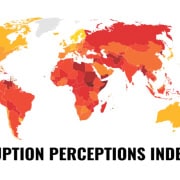|
Getting your Trinity Audio player ready...
|
It’s a new year, and the fight against corruption goes on. It is tempting to feel discouraged, but if you thought there was nothing you as an individual could do, think again! Let 2016 be the year you stand up and say: “So far, and no farther.”
While the problem might be so deeply entrenched in the private and public workings of a country that people start thinking that corruption is “just a way of life”, be aware that every society, sector and individual will benefit if you say “No more” to this crime.
Remember, if people refuse to allow corruption into their lives, there will be no opportunity for the corrupt to carry out their illegal deeds – so you as an individual most definitely can make a difference by breaking the chain of corruption in your life, which will have a knock-on effect down the line.
Whether you’re a civil servant, a member of the media, a trade union member or official, a business person, an NGO worker, or an ordinary citizen, you CAN act against corruption, starting today! The benefits are better education, improved healthcare,a functioning justice system, enhanced development, strong democracy, and more prosperity for all.
What are you waiting for? Here are some great suggestions, courtesy of the UNODC, on how you can say no to corruption.
Government officials, policy-makers and civil servants can fight corruption and…
- Strengthen democracy… By ratifying and enacting the UN Convention Against Corruption (UNCAC).
States that successfully attack corruption are far more legitimate in the eyes of their citizens, creating stability and trust. - Promote justice… By reporting incidents of corruption.
Create an environment where the rule of law prevails. When citizens and businesses feel confidence in their legal institutions’ ability to address disputes in a fair and honest manner, they can effectively limit the impact of organised crime, illicit drugs, trafficking in human beings and terrorism. - Support education… By investing in and protecting funds for education.
Future prosperity depends on the quality and performance of the educational system. Ensuring that educational funds are administered in a fair and transparent manner protects a country’s most valuable asset – its children. - Bring prosperity… By refusing to participate in any activities that are not legal and transparent.
Increases both domestic and foreign investment. Everyone is more willing to invest in countries when they see that funds are not being siphoned off into the pockets of corrupt officials. - Safeguard development… By knowing what the UNCAC requires of your government and its officials.
Rooting out corruption allows social and economic development. Companies, small and large, find it easier to stay in business when the artificial tax of corruption is removed. - Improve public health… By ensuring that funds are not diverted away from healthcare.
A well-functioning and beneficial health sector is one of the most crucial services provided to citizens, as it saves lives.
Non-governmental organisations and civil society can fight corruption and…
- Strengthen democracy… By encouraging your government to ratify and enact the UNCAC.
States that successfully attack corruption are far more legitimate in the eyes of their citizens, creating stability and trust. - Promote justice… By educating the public about the government’s responsibility to be corruption-free.
Equal and fair justice for all is crucial for a country’s stability and growth. It also helps to effectively fight crime. - Support education… By engaging youth in discussions about what ethical behaviour consists of, what corruption is and ways of fighting it, and encouraging young people to demand their right to education.
Ensuring that future generations of citizens are brought up to expect corruption-free countries is one of the best tools to ensure a brighter future. - Bring prosperity… By telling partner organisations, the private sector, government bodies and the public about the fact that a level playing field improves a country’s competitiveness.
When business environments are open and transparent, both national and international businesses are much more likely to invest. - Safeguard development… Adhere to rules on fair competition.
Corruption can shield disreputable companies from fair competition, thus allowing inefficient firms to survive, and distorting the marketplace. - Improve public health… By raising the awareness of the public, the media and governments about the costs of corruption for the health care system.
All of society benefits from a functioning health system.
The media can fight corruption and…
- Strengthen democracy… By reporting on government efforts to ratify and implement the UNCAC and on the lack of such efforts.
Keeping a close and public eye on government activities is a proven method to keep states on the right track. - Promote justice… By using the power of the internet to protect journalists who report on corruption cases and other whistleblowers.
Internet sites, social media sites and mobile phones can be used to quickly and cheaply inform large numbers of people and to publicise the plight of whistleblowers, creating protection in celebrity. - Support education… By partnering with non-governmental organisations active in education to be watchdogs and inform the public.
NGOs and the media can combine knowledge and access to the public to keep education projects transparent and funding going where it is intended. - Bring prosperity… By collaborating with the business community to cover private sector activities.
Part of a company’s worth is its reputation in the eyes of consumers. Publicising corrupt and good practices is a powerful means of keeping the business community working within the rule of law and international good practices. - Safeguard development… By learning how to professionally promote public service broadcasting and support independent unions of journalists.
A strong, free and professional media is an indicator of growth and development. Support this by staying abreast of professional journalist practices and joining independent unions of journalists. - Improve public health… By creating links with journalists, in both rural and urban settings, who report on how healthcare services are delivered to the most marginalised citizens in society.
Creating linkages between local and national resources, and then using the information they have collected to inform the public, is a powerful tool.
The private sector can fight corruption and…
- Strengthen democracy… Foster economic stability by enforcing zero-tolerance practices towards corruption.
A transparent and open business community is a cornerstone of any strong democracy. - Promote justice… Enact policies covering gifts, supply chain, whistleblowers and other key corruption issues, and educate all employees about them.
Employees will work better if they feel confident that they are operating in a fair and just environment. - Support education… Fund education programs and ensure that they are fairly administered.
Supporting a strong education system through donations and advocacy is a good investment for the future. - Bring prosperity… Strictly enforce anti-corruption measures and use independent auditors to ensure compliance. Introduce “anti-corruption strategies” into the social dialogue (see Trade Unions, below).
In the private sector, corruption increases the cost of doing business through the added tax of bribes, the additional management cost of negotiating with corrupt officials, and the legal and financial penalties of breached agreements or getting caught. - Safeguard development… Adhere to rules on fair competition.
Corruption can shield disreputable companies from fair competition, allowing inefficient firms to survive, and distorting the marketplace. - Improve public health… Ensure that companies providing healthcare follow international good practices to provide services and supplies that benefit all.
Allowing fake medicines to enter the market for reasons of greed, for example, can endanger a whole society. Citizens must not turn a blind eye to corrupt private (or public) sector practices in favour of profit.
Trade unions can fight corruption and…
- Strengthen democracy… By negotiating decent wages for public officials.
Ensuring that public servants are paid a decent wage, that they have money in their pockets, goes a long way in the fight against the temptation of lining those pockets with a bribe. - Promote justice… By defending whistleblowers.
Protect those who would put their lives and their livelihoods at risk to expose the corrupt and to bring them to justice. More people will come forward when they see it is safe to expose corruption. - Support education… By monitoring the integrity of education systems.
Our teachers not only teach and care for our children; they protect the honour of the very system that we all depend on for our kids. - Bring prosperity… By introducing anti-corruption strategies into the social dialogue and partnering with the business sector to ensure zero tolerance for corrupt practices.
A corruption-free business environment is more appealing not only to employees, but also to potential customers. - Safeguard development… By mobilising the trade unions’ collective voice and bargaining power against corruption.
Protecting and enhancing fair and transparent societies through collective action greatly aids development and reduces poverty. - Improve public health… By fighting for fair wages, good working conditions and improved service delivery for health-care workers.
Healthcare worker trade unions can improve the healthcare system and working conditions of workers, making them less vulnerable to corruption. They can also help root out corruption by adopting a zero tolerance approach among members.
Everybody can fight corruption and…
- Strengthen democracy… By educating themselves about the rule of law and what their government has pledged to do to fight corruption.
Being part of an informed citizenry is not only vital to a healthy democracy, but it holds elected officials responsible for their actions. - Promote justice… By reporting incidences of corruption to the authorities.
By coming forward, you not only stand against the corrupt, you also stand up for your community. - Support education… By teaching children that corruption is unacceptable.
Parents can teach their children the value of integrity. - Bring prosperity… By refusing to pay or accept bribes, facilitation fees or gifts.
Rejecting illicit rewards for work done or to be done sends a strong message, not only to those who would attempt to solicit favours, but also to those working with them. - Safeguard development… By telling elected officials that fighting corruption should be an integral part of all development policies.
Reminding those you put in office that they represent you, your community and your ideals, at home and abroad, is not only your right, it’s your responsibility. - Improve public health… Demand easy access to transparent healthcare information, for example on the services citizens are entitled to and their costs.
Access to basic healthcare is a right of every citizen. Knowing your rights and asking the right questions are all part of being a responsible citizen.
BREAK THE CORRUPTION CHAIN TODAY.








